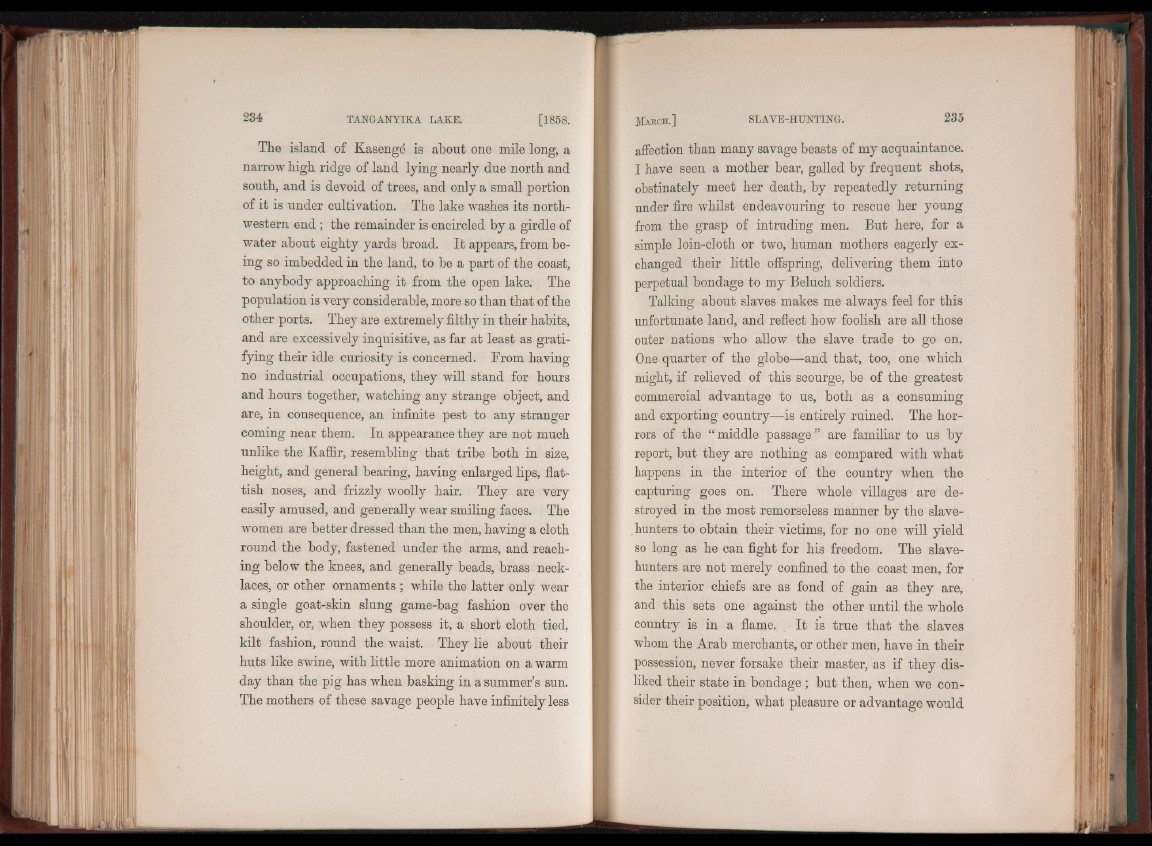
The island of Kasengd is about one mile long, a
narrow high ridge of land lying nearly due north and
south, and is devoid of trees, and only a small portion
of it is under cultivation. The lake washes its northwestern
end ; the remainder is encircled by a girdle of
water about eighty yards broad. I t appears, from being
so imbedded in the land, to be a part of the coast,
to anybody approaching it from the open lake. The
population is very considerable, more so than that of the
other ports. They are extremely filthy in their habits,
and are excessively inquisitive, as far at least as gratifying
their idle curiosity is concerned. From having
no industrial occupations, they will stand for hours
and hours together, watching any strange object, and
are, in consequence, an infinite pest to any stranger
coming near them. In appearance they are not much
unlike the Kaffir, resembling that tribe both in size,
height, and general bearing, having enlarged lips, flat-
tish noses, and frizzly woolly hair. They are very
easily amused, and generally wear smiling faces. The
women are better dressed than the men, having a cloth
round the body, fastened under the arms, and reaching
below the knees, and generally beads, brass necklaces,
or other ornaments; while the latter only wear
a single goat-skin slung game-bag fashion over the
shoulder, or, when they possess it, a short cloth tied,
kilt fashion, round the waist. They lie about their
huts like swine, with little more animation on a warm
day than the pig has when basking in a summer’s sun.
The mothers of these savage people have infinitely less
affection than many savage beasts of my acquaintance.
I have seen a mother bear, galled by frequent shots,
obstinately meet her death, by repeatedly returning
under fire whilst endeavouring to rescue her young
from the grasp of intruding men. But here, for a
simple loin-cloth or two, human mothers eagerly exchanged
their little offspring, delivering them into
perpetual bondage to my Beluch soldiers.
Talking about slaves makes me always feel for this
unfortunate land, and reflect how foolish are all those
outer nations who allow the slave trade to go on.
One quarter of the globe—and that, too, one which
might, if relieved of this scourge, be of the greatest
commercial advantage to us, both as a consuming
and exporting country—is entirely ruined. The horrors
of the “ middle passage” are familiar to us by
report, but they are nothing as compared with what
happens in the interior of the country when the
capturing goes on. There whole villages are destroyed
in the most remorseless manner by the slave-
hunters to obtain their victims, for no one will yield
so long as he can fight for his freedom. The slave-
hunters are not merely confined to the coast men, for
the interior chiefs are as fond of gain as they are,
and this sets one against the other until the whole
country is in a flame. I t is true that the slaves
whom the Arab merchants, or other men, have in their
possession, never forsake their master, as if they disliked
their state in bondage; but then, when we consider
their position, what pleasure or advantage would